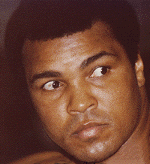

He was part carney huckster, part circus entertainer, and a wonderful poet. He is arguably the finest boxer of all time. One of the most popular fighters to ever climb into a ring. He and Jackie Robinson were two of the most important sports figures of the 20th century. He was born Cassius Marcellus Clay in Louisville, Kentucky, on January 17, 1942. A spectacular athlete, Clay was gifted with exceptionally fast reflexes, excellent hand-leg coordination, and incredible defensive skills. Cassius Clay would ultimately set the modern standard by which all other boxers would be judged.Clay became a Golden Gloves champion in 1956 at the age of 14. In 1960 he won the Amateur Athletic Union light heavyweight division and the Golden Gloves heavyweight championships. In October of 1960, Clay would win the light heavyweight championship at the Olympics held in Rome, Italy. As an amateur he won 100 of 108 fights.
With no more amateur worlds left to conquer, Clay decided to join the professional ranks. He won his first pro bout on October 29, 1960 against Tunney Hunsaker in 6 rounds. After progressively moving up the professional ranks the brash, loudmouth, 22 year old fighter was finally ready to take his place in boxing history.
On February 25, 1964, he stepped into the ring for a title match against the reigning heavyweight champion, Sonny Liston. One of the toughest fighters of that era. This fight was suppose to be a walk in the park for Liston. None of the so-called experts gave Clay much of a chance in the contest. He was up against a brutal warrior bent on punishing the young fighter for insulting comments made prior to the bout. Clay repeatedly told anyone who would listen that he was the prettiest fighter that ever stepped into the ring. His glowing praise of his talents and abilities irritated the boxing establishment. The fight game had never dealt with such impertinence.
Sonny Liston was feared by every boxer in the heavyweight division. Yet, despite the awesome reputation of his opponent, Clay maintained that he would win this battle. He loudly proclaimed for the world to hear that the heavyweight title would belong to him. And so he would. On that cold winter night back in 1964, Clay did as he forecasted. He "Shocked the world!!!".

He gained the crown in a 7th round knockout of Liston. He was (until Mike Tyson) the youngest fighter ever to win the heavyweight championship. Cassius Clay used his superior speed and punching power to overcome a tremendous opponent. The experts were left speechless. His hometown of Louisville, Kentucky beamed with pride. His parents became instant celebrities. And Clay stepped out of the shadows and onto the world stage.
Later in 1964, Clay would publicly announce a momentous decision. He informed the world that he joined the Nation of Islam (Black Muslims) and adopted the name of Muhammad Ali. This decision came at an awkward time of the history of America. There was the assassination of JFK, the black unity messages of Malcom X, the civil rights protest led by Dr. Martin Luther King, the Vietnam War, the emergence of the Beatles - and many other social issues. Yet, despite the controversy, Ali stood by his new name and his adopted faith.
Ali was a master showman and one of his regular routines was to supply the public with witty poetic verses prior to every fight. "I am the greatest", "Float like a butterfly, sting like a bee", the 'Ali Shuffle' (fast movement of his feet - meant to daze and confuse his opponents), and the "Rope - a - Dope" were some of his more memorable phrases. All would eventually become part of everyday language.
Muhammad Ali successfully defended his title nine times from 1965 to 1967. He was universally recognized as the heavyweight champion after outpointing the World Boxing Association champ, Ernie Terrell, in 15 rounds on February 6, 1967. Prior to the fight Terrell refused to acknowledge Ali by his Muslim name. Repeatedly referring to him as Cassius Clay. This slight so infuriated Ali that during the fight he continually bombarded the overmatched Terrell with blow after punishing blow. All the while yelling for the dazed and battered loser to tell the world his name. Ringside spectators told stories of hearing nothing but the sound of leather meeting Terrell's body and Ali shouting, "What's my name". It was as if a royal spanking were taking place for the world to see.
Despite his domination of the boxing game, Ali would encounter a number of problems outside of the ring. Most notably, in 1967 he refused to submit to induction in the military and was subsequently convicted of violating the Selective Service Act. Ali's controversial decision not to sign up for the draft was based on his insistence that as a Muslim minister, he should be exempt from serving in the military. Unfortunately, Uncle Sam did not see it that way and neither did the boxing world. Following a conviction on the charge of draft evasion, Ali was barred from the ring and stripped of his title.
One can only guess how much this must have hurt him. Yet, despite this setback, a resourceful Ali made a living by lecturing on college campuses and at peace rallies for much of his suspension. Outside of the ring Ali would become a prophet for peace, a world statesman, and a civil rights activist. Serving on the battlefields in Vietnam was a true sore spot for most African-Americans at that time. Many were fighting and dying for a country that would not even allow them the right to vote in some areas. Most black Americans could not sleep, eat or drink in various places across the land. Many were denied housing, jobs, and other privileges commonly accorded to most white Americans. Ali stood up against such intolerance. He was seen by many as a hero who battled injustice and racism all over the world.
Most boxing experts agree that Ali lost what would have been the three best years of his storied career. Many of his critics voiced the opinion that if he returned to boxing, his skills would be so greatly diminished that he would never regain the heavyweight title. At last in 1971 the U.S. Supreme Court reversed the controversial legal actions that barred Ali from the fight game. The way was clear for Ali to regain his throne.
On March 8, 1971 he lost a controversial 15 round decision to then heavyweight champion 'Smokin' Joe Frazier. For the next three years Ali fought a succession of heavyweight contenders, including a brutal rematch against Joe Frazier that was billed as the "Thrilla in Manila".
On October 30, 1974, Ali was once again thrust into the role of underdog against an overwhelming foe. George Foreman was the celebrated Olympic champ and King of the heavyweight division. It was against this tremendous opponent that Ali devised the famed "Rope-a-Dope" strategy. Ali decided that the best way to beat Foreman was to let the younger boxer swing away until he grew tired. It was then that Ali moved in for the kill and delivered enough blows to knock Foreman out in the 8th round - thereby regaining the heavyweight crown.
Following the "Rumble in the Jungle", Ali would successfully defend his title six times before falling to lightly regarded Leon Spinks on February 15, 1978. Ali would regain the title seven months later - becoming the first boxer ever to win the heavyweight title on three separate occasions. At his retirement Ali posted a record of 56 wins and 5 losses. More importantly, he secured the love and affection of millions of fans all over the world.
These are the bare bone facts about Muhammad Ali. There are many subtle issues and unseen events that will never be adequately put into words. Like the sense of pride that Louisvillians feel knowing that he was born and raised right here in the Derby City. Ali attended Central High School here in Louisville - imagine how proud we are to know that he sat in some of the same classrooms as we have. Some of the same streets that he walked as a youth - many of us have also trekked.
Muhammad Ali is separate and distinct from today's spoiled and obnoxious athletes. When you meet the man he makes you feel as if you are special. Ali was not afraid to stand up for what he believed in - regardless of how controversial that cause might be. The spoiled brats that garner so much of the headlines in the national media today only stand up for themselves and their own selfish monetary interest.
Ali was prepared to go to jail to protest a war that should never have been. The thugs and criminals in sports today routinely go to jail in support of their own lurid and obscene pursuits. Ali did not let shoe contracts and other endorsements get in the way of standing up for what is right, just and good. Many of today's athletes turn their backs on the problems of the world with a selfish focus on themselves. Ali was not afraid to wear the mantle of role model. When he would ask groups of wide-eyed kids to stay in school and respect their parents everyone listened and readily obeyed his request.
There is much to admire about Muhammad Ali - the man, and Ali - the boxer. His will to rise to the top despite being an underdog on so many occasions sets him apart from most sports celebrities. We will never forget his ability to overcome tremendous odds time after time. The success that Ali gained provided many young African Americans with the hope that they could someday succeed in a world that was often cruel and unfair. Ali is indeed a cultural icon. A man who gave his all both inside and outside the ring. A man that stood up for people all over the world.
Ali proved that honor and integrity meant something. He showed the world that if an individual worked hard - then success would surely follow - no matter what roadblocks stood in the way. Ali made all African-Americans feel a sense of pride in their racial heritage and in themselves as human beings. Moreover, Ali made people the world over take stock in themselves. His common message to all was, "You are somebody". This was spoken through word and deed many times over.
Muhammad Ali is more than an athlete.
He is a blessing bestowed upon humanity.
A beacon for all to follow.
He has shown us how to live with dignity, courage, and determination.
The members of the Derbytown Senate will forever consider it an honor to have met the most noted and beloved athlete of the 20th century and beyond.
Last revision October 15, 2000


Copyright © October 2000 - Derbytown Senate Home Page